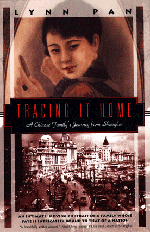GOLDSEA | ASIAN BOOKVIEW | MEMOIRS
Tracing It Homeby Lynn Pan
Kodansha Globe
New York, 1992, 229pp, $14 (Paperback)
The intimate account of a Chinese Family's Journey from Shanghai to London
EXCERPT:
 hanghai's fall to communism was only two years off. My parents had lost their Lagonda, but they were still eating their meals off a dinner service bearing their own family hallmark, fine wucai porcelain ordered from the famous kilns of Jingdezhen; waited on by servants commanded by a bark or murmur or meaningful glance. They went dancing still, soignes in their furs and satins, even though the giddy inflation was devaluing the yuan in their pockets fivefold, tenfold, thirtyfold...and what bought a twelve-course banquet last week and a chicken yesterday would barely run to an egg this evening. Half the world had altered, it was time to draw in your horns, but still they kept a glow on life, as people will on the day before Judgement Day, sipping nectar from poisonous flowers.
hanghai's fall to communism was only two years off. My parents had lost their Lagonda, but they were still eating their meals off a dinner service bearing their own family hallmark, fine wucai porcelain ordered from the famous kilns of Jingdezhen; waited on by servants commanded by a bark or murmur or meaningful glance. They went dancing still, soignes in their furs and satins, even though the giddy inflation was devaluing the yuan in their pockets fivefold, tenfold, thirtyfold...and what bought a twelve-course banquet last week and a chicken yesterday would barely run to an egg this evening. Half the world had altered, it was time to draw in your horns, but still they kept a glow on life, as people will on the day before Judgement Day, sipping nectar from poisonous flowers.
They hardly knew what to think any more. One year it was everybody saying, 'Let's have done with civil war.' The next it was hostilities as usual. For all the talk of a negotiated peace, the Kuomingtang and the communists were still at each other's throats. How would it all end? Not so long before, a communist victory was the last thing in anyone's mind. Now you couldn't be sure. Would no one appear at the eleventh hour offering rescue? They heard it said that American succour was half-hearted, yet they could scarcely credit this, habituated to the idea of the US in the role of deus ex machina. Nothing had seemed beyond the reach of American power and generosity at the time of the great victory over the Japanese; and to the imagination of a battered and exhausted city, the arrival of the American GIs in Shanghai had seemed like a promise of great times ahead. With that eternally hopeful air of theirs, that aura of limitless bounty, Americans so easily inspired optimism. Peace could, once again, be the making of Shanghai, which in that moment of grace had felt the best of all places to be, buoyed, renewed, its fate no longer equivocal.

No question about it, the Americans were what everyone called them when they first came to town: dinghao, the 'very best'. Their presence was essential to that ambiance of victory, the cheering in the streets, the imagined sensation of being showered with confetti.
Only, they liked to be on the side of the angels, these Ameicans, to have all things both ways; to have their cake and eat it, to extricate themselves from the embrace of Chiang Kai-shek but not to fall into the arms of Mao Zedong, to be doctrinally antipathic to communism yet avowedly idealistic. If only the Kuomingtang could have had the communists' puritanical fervour and self-discipline, they thought, without the Marxism. It was a pity you couldn't have a better object for your philanthropy: unreliable, predatory, corrupt, the Kuomingtang government did not come up to snuff. It was not the sort of government to which even Americans would say, If you need anything, you need only to tell us. Yet many, far too many, were the people who held on to the hope that US dollars might miraculously halt the advance of the enemy.
ASIAN AIR ISSUES FORUM |
CONTACT US
© 1999-2003 GoldSea
No part of the contents of this site may be reproduced without prior written permission.
